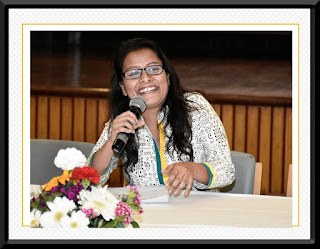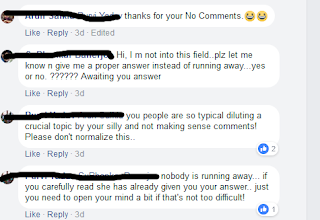“Ye wo saree hai
jiske bhagwe rang mein jabardasti tumhne bharat maa ko lapeta hai
Issi saree mein
tumhne bastar ko baand ghaseeta hai
Ye saree kisi ke
baap ki jageer nahi
Ye tumhare
sanskriti ke wet dreams ki tabeer nahi hai
Isse hum tumhare
bematlaab sawalo aur illjamo bhare muh ko baand dete hai
Aur jab maan
chaah jaise man chaha isko pehan chal dete hai”
We
got an opportunity to participate in “Voice Studio: A
dialogue among youth to explore ways to a democratic discourse” organized on the
last day of the IAWRT 14th Asian Women’s Film Festival on 7th March
2018.
Women’s rights activist
and documentary filmmaker Vani Subramaniam began the discussion by highlighting
the fact that in the recent years, how national politics has influenced the education spaces in a way that the
democratic university spaces are under constant attack affecting the women
students most. Yousuf Sayeed’s film ‘Campus Rising’ was screened which
showed student agitations in colleges and universities in India over the past
few years challenging the patriarchal and structural shackles.
The film worked
perfectly as the mind jog for the discussion ahead. Usha Shiv from Jadhavpur
University talked about the issues girls are facing on daily basis, struggling
with the patriarchal mindsets, and also how state misuses its powers and exerts
it upon the students by holding their admissions ransom in terms of even
molesting the girl students. Along with the challenges she spoke about how they
are making impacts for example setting up vending machines for sanitary napkins
in the campus.
Prajakta Prabhakar
Shedde from Dr Babasaheb Ambedkar Marathwada University Aurangabad, highlighted
the issues of gender and caste in her University, struggles of SC/ST students
who have been denied scholarships and their ongoing protests. She widened the
horizon of the discussion by talking about how State is shutting down schools
in backward areas giving the excuse that there are less number of students
without thinking the “even if there is a single student, there has to be a
school” Also the lack of infrastructure in terms of road connectivity how
will a student go from his/her village in rainy season to the school which is
miles away. She shares an interesting example where because of their efforts,
the authorities started a bus service for students of a remote village to their
school. Prajakta shared an incidence when she went to talk about menstrual
hygiene in the remote areas, women actually said that with the cost of sanitary
pad they can buy food for their family then why would they invest their money
for their personal benefit? This shocked her and at the same time highlighted
the deep gap in what is said, what is offered and what is available to the
people belonging to various strata of society.
The struggles of
students trying to fight for the democratic rights in University would have
been incomplete if there was no discussion on Rohit Vemula. Sirisha from the Centre for Women’s studies,
University of Hyderabad spoke about how the university spaces have become
threatening not only with the gender perspective but also in terms of caste and
class. She spoke about her personal experience of becoming first women
president in the University, the struggles, the cat calling and her constant
fight with the administration for even small decisions precisely because she is
a women representative.
The discussion headed
to an interesting turn when girls from a village about 25 kms away from Rewari
took over. These brave hearts forced the state government to accept their
demand of upgrading the village school from class X to class XII, making it a
senior secondary school. The nearest senior secondary school is about 3 kms
away and the female students of classes IX and X, feared being molested on the
way and many of them had to drop out because of this. These girls were accompanied
with Sarpanch of the village and another lady who supported them in their
fight. One of the girls said, “When we told about what used to happen to
us on our way to school, our mother would say that leave school. But that’s not
a solution. Education is our right and every girl should have that right. I
need to study and nobody can stop me from that, so we sat on anshan”
Sarpanch Suresh Chauhan
elaborated the struggle that they went through, the allegations, the pressures
from all spheres, no support from villagers. But when he had of all reasons to
give up hope, he motivated all the villagers to join the fight and then finally
their demands were met and they got recognition from media as well.
“We were
constantly reminded that you can’t do this. They used to say that when they
scrapped older people, don’t think that you kids can do anything? Ye baccho ka
khel nahi hai” shared the other girl with
determination beaming in her eyes.
Satrupa from Jawaharlal
Nehru University in her most natural flair began the conversation on nationalism
and how students of JNU or practically anyone who raises questions are termed
as Anti nationalist and are threatened in the most convenient way. She also
highlighted how JNU is a constant target since last 3 years when Modi government
came into power. She gave an entire different perspective to their ideology and
then discussion contrary to what is being portrayed by famous Media houses.
Lubna from Aligarh
Muslim University very quickly shared how our history and education is being
corrupted and the facts are manipulated as per the change in socio political atmosphere.
She with the example of recent Bollywood movie “Padmavat” talked about how
media easily modulates their thought process into the historical facts and
glorifies patriarchal mindsets. It was also interesting to hear her talk about
gender and sexual identities on the backdrop of medieval history.
Sabika Abbas Naqvi, a
gender rights activist and founder of Sar-e-Rahguzar, a movement to bring
poetry onto the streets was the last speaker of the session. She strongly
brought out the concerns of the women on campus and pointed out that there
wasn’t much difference between the masculine politics that one faces inside and
outside the campus. “Many years back, the hostel rooms were shut down at
9.30 pm and now at 10 pm, we have just got half an hour ahead in all these many
years. Our struggles began with getting clean water to speaking out about
rights loud and clear”. She highlighted the need of reclaiming public
spaces where she also mentioned her recent work where they perform protest
poetry along with bharatnatyam in public
spaces to shake people out of their comfort zones, force them to pause whatever
urgent journey they’re on and listen.
Each of her words
demanded freedom from the shackles of patriarchy, caste and religion
discrimination in the most fluent way which made audience instantly connect to her.
She spoke about one of the poetry events in Lucknow where she was the only
female poetess among many poets and the moment she started the poem of resistance
their jaws dropped!
She closed the session
with her poetry on “Meri saree” which was about the traditional nine-yard
cloth that has been objectified, sexualized and yet remains one of the
strongest symbols of female courage and identity. She embodied the struggles of
women from Kashmir, to Bastar to North east to challenging the toxic masculinity
inflicted on women not just in her day to day life but also what media projects. To hear "meri saree" please click on the following link-
Sabika Abbas Naqvi Performs 'Meri Saree' at Marine Drive
Sabika Abbas Naqvi Performs 'Meri Saree' at Marine Drive
It was overwhelming, difficult and inspirational at the same moment to witness
the power of woven words by Sabika, it actually left many of us teary eyed, with
a hope and believe that though the struggle is long but we are not alone!

































